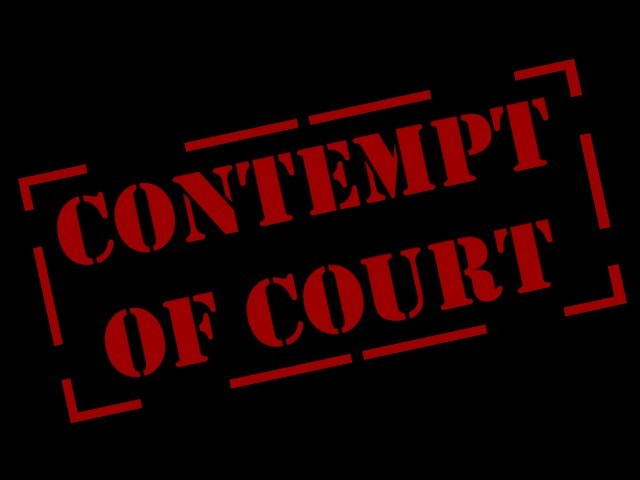Contempt of Court, or simply “contempt,” is the act of being disobedient to or contemptuous toward a court of law and its officials by engaging in behavior that contradicts or challenges the Court’s authority, justice, or dignity. The learned Single Judge’s order in Contempt Petition No.79/2015, which recorded a prima-facie finding that the appellants were liable for action under Section 10 read with Section 12 of the Contempt of Courts Act, 1971, and also under Article 215 of the Constitution of India, as well as the subsequent order framing charges against the appellants, is the subject of challenge in this contempt appeal filed under Section 19 of the Contempt of Courts Act, 1971. This Judgement was pronounced on 14.01.2022 in front of the Learned Judge CHANDURKAR, J in the case SHRI SUDHAKARRAO GRAMVIKAS PRATISTHA, DONGARGAON THR. SECTY. WASUDEO SITARAMJI MAHALLE AND ANOTHER V. GAJANAN LAXMNARAO PECHE AND 2 OTHERS.
Facts of the case – Respondent no.1 worked as a ‘Junior College Teacher’ for Shri Sudhakarrao Gram Vikas Pratisthan, Dangargaon, appellant no.1 is Secretary. Appellant no.2 is the Head Master of Vivekanand Junior College, where respondent 1 worked. Respondent no. 1’s services were terminated on November 27, 1998. An appeal was filed under Section 9 of the Maharashtra Employees of Private Schools (Conditions of Service) Regulation Act, 1977 (for short, ‘the Act of 1977’) to overturn the termination decision. By his Judgment dated 07.02.2007, the learned Presiding Officer of the School Tribunal allowed the said appeal and, after setting aside the order of termination, directed that respondent no.1 be reinstated in service and be paid back wages from November 27, 1998, until his reinstatement within 60 days.
The Management and the Junior College appealed the School Tribunal’s decision in Writ Petition No.974/2007, summarily dismissed on January 15, 2008. As the School Tribunal’s decision was not followed, respondent no. 1 filed a criminal complaint with the learned Judicial Magistrate First Class, citing Section 13 of the Act of 1977. The appellants were found guilty of the crime punishable under Section 13 of the Act of 1977 by the learned Magistrate in an order dated July 5, 2014. They were fined Rs.50,000 apiece and condemned to one month of simple jail if they did not pay the fine. On 16.12.2014, respondent no.1 filed a complaint with the School Tribunal, alleging that, despite the learned Magistrate’s ruling on 05.07.2014, the appellants had failed to reinstate him and pay him his back salary.
On March 3, 2015, respondent no.1 filed Contempt Petition No.79/2015 under Section 12 of the Act of 1971, read with Article 215 of the Indian Constitution. The learned Single Judge took cognizance of the alleged contempt on 11.01.2016 by admitting the contempt petition and framing charges against the appellants as to why they should not be punished for wilfully disobeying the School Tribunal’s Judgment dated 07.02.2007 after serving notice on the respondents. Having been wronged by the previous order, the appellants have filed this appeal. Further proceedings in Contempt Petition No.79/2015 were stopped while the appeal was pending.
Learned Counsel of the appellant, Shri S.M.Vaishnav, there was no occasion to file the present contempt petition on 03.03.2015. According to the plaintiff, the learned Single Judge was not justified in taking cognizance of the claimed non-compliance with the School Tribunal’s ruling of 07.02.2007. According to that ruling, respondent no. 1 was to be restored in his job, and his back pay was to be reimbursed within sixty days. Respondent No. 1 started proceedings under Section 13 of the Act of 1977 on August 31, 2008, after invoking jurisdiction in the context of disobedience with the School Tribunal’s ruling. The appellants had been found guilty in these proceedings, and it had been determined that they were guilty of the offense punishable under Section 13 of the Act of 1977.
It was then claimed that Contempt Petition No.79/2015 was filed after the time limit set by Section 20 of the Act of 1971 had expired. According to the rule mentioned above, contempt proceedings might be started within one year of the claimed non-compliance. Because the School Tribunal’s Judgment was delivered on 07.02.2007 and the writ petition challenging it was dismissed on 15.01.2008, it was clear that the cause of action for instituting contempt proceedings began on 07.02.2007 or, in this case, 15.01.2008, and the one-year period ended on 15.01.2009.
Learned Counsel for respondent no. 1, Shri V.A.Kothale, contested the abovementioned arguments, claiming that the failure to restore respondent no. 1 in service and payback wages was a continuing injustice. Although respondent no.1 had begun proceedings under Section 13 of the Act of 1977, this did not prevent respondent no.1 from using this Court’s contempt authority. He drew attention to Contempt Petition No.79/2015, claiming that it had been filed under Section 12 of the Act of 1971, read with Article 215 of the Indian Constitution.
Upon hearing both sides, the learned Judge concluded the appellants’ objection to the learned Single Judge’s decision recording a prima facie finding that the appellants were liable for action in contempt jurisdiction. Thereby formulating charges against them did not deserve to be interfered with. The contempt petition would have to be adjudicated on the merits of respondent no.1 was not restored in service and paid back wages until 10.07.2016, when the respondent’s services were resumed. The Judge does not think it’s essential to go through the merits of the defense offered in that contempt petition since it’s still pending. Therefore, the Judge has not looked at the other cases relied on by the appellants’ skilled Counsel. Except for the defense based on Section 20 of the Act of 1971, the appellants would be free to submit all lawful reasons before the knowledgeable Single Judge. Contempt Petition No.79/2015 will now be judged on its own merits in conformity with the law due to the clarification mentioned above.
Click here to view the Judgment
Reviewed by Rangasree


